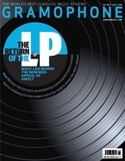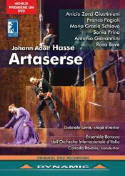Texte paru dans: / Appeared in: |
|
|
Outil de traduction (Très approximatif) |
|
|
Reviewer:
David Vickers
Dynamic’s recording (available on DVD and CD) captures a production staged in July 2012 at the Valle d’Itria festival in Puglia. Franco Fagioli sings the heroic part of Arbace (the same role he sang for Fasolis’s recording of Vinci’s setting); in extrovert coloratura arias neither his mannered singing nor posturing approach to skin-deep acting are dramatically convincing. However, Hasse ensures that the dramatic tensions are brought to the boil compellingly at the end of Act 2: Arbace’s dignified return to prison after his treacherous father’s condemnation (‘Per questo dolce amplesso’, sung tenderly by Fagioli) prompts Mandane’s furious outburst (‘Va’ tra le selve ircane’, executed by Maria Grazia Schiavo with dramatic authority and impressive vocal technique), to which the guilty Artabano responds in a tormented soliloquy, ‘Pallide il sole’ (an aria famous across Europe in the 18th century, sung eloquently by Sonia Prina).
The large outdoor stage influences the singers to make exaggerated yet vague gestures, and the static approach to staging recitative conversations between characters inhibits the detailed theatricality that Metastasian drama needs in order to come truly alive. Corrado Rovaris directs from the harpsichord with an astute eye on dramatic pacing, but there are a few musical bumps in the road. For example, in the Overture it takes the orchestra several bars to get themselves properly in time, and too often Hasse’s customarily long lyrical arias full of Lombard rhythms lack the deft limpidity they crave. Interested parties will find enough here to recognise some of Hasse’s under-valued merits and therefore might not mind the warts-and-all performance or the uninspiring production – but it is at best a distinctly mixed bag. |
|
|
|
|
|
Cliquez l'un ou l'autre
bouton pour découvrir bien d'autres critiques de CD |
|




